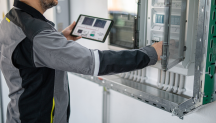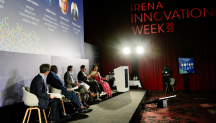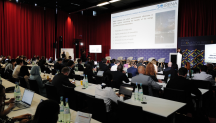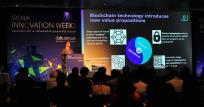
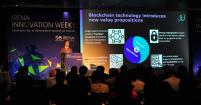
A Digitalised, Decentralised Future is Around the Corner
Newsletter
“We need to identify, refine, implement, and scale up innovations that promise to become solutions for a renewables-powered future,” encouraged IRENA Director-General Adnan Z. Amin during the opening of IRENA Innovation Week on 5 September 2018. Delivering the opening remarks to the event’s 'Digitalisation and Decentralisation Track', his words set the tone for a rich series of presentations and panel discussions exploring how emerging innovations are impacting the way we manage and distribute energy.
Today renewables exist mainly at utility-scale — as hydroelectric dams, and wind and solar farms — but a shift to more distributed and decentralised generation is developing, in the form of rooftop solar PV. Decentralisation along with electrification, brings with it new challenges, particularly in managing and optimising power systems to handle new demand and a large number of small generators. Fortunately, digitalisation offers a solution to do this in a smart way.
Terms like “blockchain”, “big data”, “artificial intelligence” and “internet of things” have become catchphrases in popular culture, but in the power sector they represent transformative innovations with real consequences, helping to drive the energy transition in both developed and developing countries. Discussions at IRENA Innovation Week addressed the digital and decentralised innovations moulding our future.
Blockchain
‘The reason you don’t see a solar panel on every roof in #Africa is because there is no marketplace for small investments. #Blockchain and its applications can help with that’ @TheSunExchange’s Morwesi Ramonyai #IRENAInnovationWeek pic.twitter.com/cOF1grTVh5
— IRENA (@IRENA) September 5, 2018
Everyone knows Bitcoin, but relatively few understand the distributed ledger technology behind it known as blockchain. In the energy sector blockchain technology offers many possibilities, and could pave the way for sophisticated networks that in a decentralised and democratic manner manage the entire distributed energy value chain. From the management of energy generation and distribution to billing, sales, and payments, innovative financing, contract management, trading and incentives, and others.
During Innovation Week discussions, participants strove to clarify how blockchain technology can tangibly contribute to the increased deployment of renewable power in electricity systems, the associated risks, and what policymakers and regulators can do to enable this.
Jan Vorrink, Manager of National and Regional Control Centres at TenneT TSO BV, described how his company uses blockchain with electric vehicles to improve grid flexibility and stability, while The Sun Exchange’s Managing Director, Morwesi Ramonyai argued that the technology can be used to efficiently crowd-fund renewable energy projects in developing countries, helping to accelerate energy access.
Artificial intelligence and big data
“It’s better to have artificial intelligence than no intelligence,” said Stephen Woodhouse, Chief Digital Officer of Pöyry. Technology advancements in artificial intelligence (AI) over the last few years in conjunction with growth in generation from distributed renewables, smart devices and demand management services, among others, is leading to major changes in the power sector.
‘We are about to move into a new era of AI, where AI doesn’t just automate a process but changes the way we’ve been doing things’ – @IBMindustries’ Marc Peters #IRENAInnovationWeek pic.twitter.com/JkIfHu9icr
— IRENA (@IRENA) September 5, 2018
As power systems become more complex, the role of AI is evolving from being a facilitating and optimising tool to an absolute necessity. AI has the potential to enable better grid integration of distributed energy sources, like wind and solar, by forecasting generation and consumption and thus reducing intermittency in the system.
In the solar and wind sectors, there is an enormous amount of data, and to-date most advances supported by AI have been in meteorology, control, and predictive maintenance. However, in the future, AI will benefit immensely from the uses of that data, in terms of decision making and planning, condition monitoring, robotics, inspections, certifications, supply chain optimization and generally increasing efficiency. “We are about to move into a new era of AI, where AI doesn’t just automate a process but changes the way we’ve been doing things,” said Marc Peters, CTO of Energy, Environment and Utilities Europe at IBM.
The new consumer — the prosumer
“In Brazil, energy consumers are willing to take a more active role in decision-making and technology will be an enabler. This in inevitable.” - @EPE_Brasil’s Luiz Augusto Barroso, Former CEO #IRENAInnovationWeek pic.twitter.com/oxgPPA7qs4
— IRENA (@IRENA) September 6, 2018
Beyond your television, ‘smart devices’ in your home could play a big role in energy control. The growth of distributed electricity generation, like solar panels on your roof, and the widespread availability of storage appliances and smart devices have created new opportunities for consumers to engage in the energy transition and become more active players.
“In Brazil, energy consumers are willing to take a more active role in decision-making and technology will be an enabler,” Former CEO of Brazil’s Empresa de Pesquisa Energética, Luiz Augusto Barroso said. The availability of smart home devices has spurred a demand for continuous monitoring and control of electricity consumption. Consumers are now beginning to explore avenues to optimise their consumption and better manage their electricity bills. However, as pointed out by Ina Letho, a senior advisor for Finnish Energy, domestic customers’ reaction to fast-changing price signals will probably be managed mainly through automation.
Access through innovation
“Innovation is as good as the impact it makes, and the impact needs to be sustainable. We need to innovate now to encourage behavioral change.”- @habibat11 from @sosairen Nigeria #IRENAInnovationWeek pic.twitter.com/VvSJGoWreo
— IRENA (@IRENA) September 6, 2018
“For broadening energy access through innovation, it ought to be embedded in the communities it targets – innovation is only as good as its impact,” said Habiba Ali, CEO of Renewable Energies Nigeria. In the pursuit of universal access to energy, the emergence of major digital and physical innovations, technological advancements and market-driven financing instruments, is disrupting markets.
Using solar panels, smart phones, and the internet, empowered consumers in low-income countries are now leapfrogging into an information-based digital economy that is growing significantly faster than the global economy – creating opportunities for enabling growth and job creation while addressing climate change.

